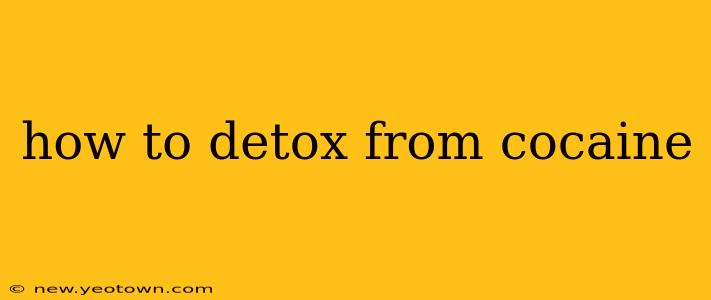How to Detox From Cocaine: A Journey to Recovery
Cocaine addiction is a serious health crisis, but recovery is possible. This journey is rarely easy, and it's crucial to remember that you're not alone. This guide offers information on navigating cocaine detox, but it's not a substitute for professional medical guidance. Always consult a doctor or addiction specialist before attempting any detox program. Improper detox can be dangerous and even life-threatening.
What Happens During Cocaine Detox?
Cocaine withdrawal symptoms can be intense and vary from person to person, depending on factors like the length and severity of addiction, the amount of cocaine used, and individual health. These symptoms are often unpleasant and can include:
- Intense cravings: An overwhelming urge to use cocaine again is a hallmark of withdrawal.
- Depression and anxiety: Mood swings are common, ranging from intense sadness to crippling anxiety.
- Fatigue and lethargy: Extreme tiredness and lack of energy can make even simple tasks feel impossible.
- Irritability and aggression: Individuals may become easily frustrated and prone to outbursts.
- Insomnia or hypersomnia: Difficulty sleeping or excessive sleeping can disrupt daily life.
- Increased appetite or loss of appetite: Significant changes in eating habits are frequent.
- Psychomotor agitation or retardation: This can manifest as restlessness or slowed movements.
What are the Different Methods of Cocaine Detox?
There isn't a single "best" method, as the most effective approach depends on individual needs and the severity of the addiction. However, here are the common pathways:
-
Medically Supervised Detox: This is the safest option. It takes place in a hospital or specialized treatment center under the care of medical professionals. They monitor vital signs, manage withdrawal symptoms with medication (if necessary), and provide support.
-
Outpatient Detox: This involves regular visits to a clinic or therapist for support and medication management. It's suitable for individuals with milder addictions and a strong support system. However, it requires a high level of self-discipline and may not be appropriate for everyone.
-
Detox at Home: This is highly discouraged and generally not recommended. Cocaine withdrawal can be dangerous, and attempting detox at home without professional supervision can lead to serious complications or relapse.
How Long Does Cocaine Detox Take?
The duration of detox varies, but the acute withdrawal phase usually lasts for several days to a couple of weeks. However, the cravings and other psychological symptoms can persist much longer, often requiring ongoing therapy and support.
What Medications are Used During Cocaine Detox?
There's no single medication to cure cocaine addiction, but some medications can help manage withdrawal symptoms. Doctors may prescribe medications to address specific issues like depression, anxiety, or insomnia. The use of medication is always a decision made in consultation with a healthcare professional, tailored to the individual's specific needs.
What Happens After Cocaine Detox?
Detox is only the first step in recovery. Successful long-term recovery often involves ongoing treatment, including:
-
Therapy: Cognitive Behavioral Therapy (CBT) and other therapeutic approaches help individuals identify triggers, develop coping mechanisms, and address underlying issues contributing to addiction.
-
Support Groups: Groups like Narcotics Anonymous (NA) provide a supportive community and a platform for sharing experiences.
-
Medication-Assisted Treatment (MAT): In some cases, ongoing medication may be necessary to manage cravings or co-occurring mental health conditions.
-
Aftercare Planning: This is crucial to prevent relapse. It may include ongoing therapy, support groups, and regular check-ups with a healthcare professional.
Can I Detox From Cocaine on My Own?
Attempting to detox from cocaine alone is extremely risky. The withdrawal symptoms can be severe and potentially life-threatening. Always seek professional medical help.
Remember: Seeking help is a sign of strength, not weakness. If you or someone you know is struggling with cocaine addiction, please reach out to a medical professional or addiction treatment center immediately. There are resources available to help you on your path to recovery. Your life is valuable, and recovery is possible.

